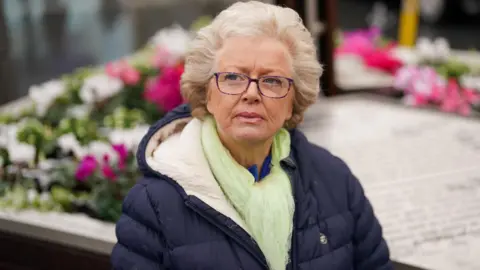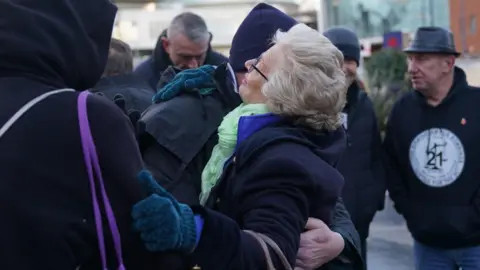Pub bombings: 'Where's our public inquiry?'
 PA Media
PA MediaA campaigner for victims of the Birmingham pub bombings has asked "where's our public inquiry?"
Julie Hambleton, who lost her sister Maxine in the blasts in November 1974, said she asked the question after watching inquiries into Grenfell, the Manchester Arena bombing, Omagh, Bloody Sunday and others.
On the 50th anniversary, she asked: "Why is nobody outraged by the mass murder of 21 innocent souls and the 182 plus survivors who live with it every day?"
Prime Minister Keir Starmer told the BBC a decision would be made as quickly as possible, adding: "We must always get to the bottom of what has happened."
Grilled by BBC Radio WM presenter Kath Stanczyszyn, as he took questions from BBC regions around England, Sir Keir said the 1974 atrocity "was an absolutely awful incident".
He said: "We are engaging with the communities and campaigners. It's very important that we do and we’ll listen to what they’re asking for."
Addressing the campaigners' long wait for answers, he said: "We'll keep talking to them and engage and come to a decision as quickly as we can, but it is important that we listen to as many voices as possible and that’s what the Home Office is doing.”
He said: “We’ll try to come to a decision as quickly as possible."
Sir Keir added: "I do understand how important it is for people who have waited a very, very long time already.”
And he said: “I’ve fought for justice all my life. Before I was a politician I was a lawyer and was very often representing victims and campaigners in any number of injustices, and therefore I bring that approach to it.
"We must always get to the bottom of what has happened in awful incidents and there should be nothing that stops us getting to the bottom of those questions.”

Ms Hambleton set up the Justice for the 21 campaign group to call for a public inquiry and said it was "quite right" that tragedies like Grenfell and the Manchester Arena attacks should be the subject of their own inquiries.
But she added: "I remember one day watching the news about some of them and I thought 'where's our public inquiry?'"
Ultimately, she said she hoped that an inquiry would lead to new information being revealed, and this would lead to the successful prosecution of those responsible.
West Midlands Police Chief Constable Craig Guildford has said their investigation remained open and any fresh evidence would be looked at.

Six innocent men were convicted of murder and jailed for life in 1975.
However, evidence against the Birmingham Six was discredited over the years and they were freed on appeal in 1991.
While the IRA never officially admitted responsibility, it is widely believed to have been behind the attacks.
The 2019 inquest ruled the victims were unlawfully killed by the IRA, but did not determine the identities of those responsible.
Ms Hambleton said: "Every anniversary is difficult, every day is difficult, you learn to adapt for self-preservation. Time does not heal, it's a load of rubbish.
"Time does not heal and having to fight for justice for decades only festers the grief and the sorrow the depth of loss."
Analysis
By Rob Mayor, Political Editor, BBC West Midlands
It's a long time since we heard a prime minister talking about the Birmingham pub bombings, so that in itself is a significant moment.
Sir Keir did not rule out the public inquiry that campaigners are so desperate to see.
However, they will also note there was no commitment to when a decision might be made.
The prime minister did promise, however, that any potential for difficult truths to be revealed about what the state knew about the bombings and when, would not be used as a reason to block any process to discover what really happened in 1974.
Follow BBC Birmingham on BBC Sounds, Facebook, X and Instagram.
